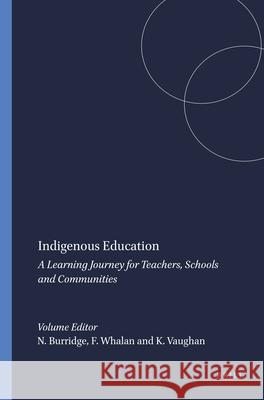Indigenous Education : A Learning Journey for Teachers, Schools and Communities » książka
Indigenous Education : A Learning Journey for Teachers, Schools and Communities
ISBN-13: 9789460918865 / Angielski / Miękka / 2012 / 176 str.
Indigenous Education : A Learning Journey for Teachers, Schools and Communities
ISBN-13: 9789460918865 / Angielski / Miękka / 2012 / 176 str.
(netto: 178,49 VAT: 5%)
Najniższa cena z 30 dni: 179,73
ok. 22 dni roboczych.
Darmowa dostawa!
Education is an essential pathway to bridging the divide in educational attainment between Indigenous and non- Indigenous students. In the Australian policy contexts, Indigenous Education has been informed by a large number of reviews, reports and an extensive list of projects aimed at improving educational outcomes for Aboriginal and Torres Strait Islander children. Central to each has been the investigation of the inequity of access to educational resources, the legacy of historical policies of exclusion and the lack of culturally responsive pedagogical practices that impact on Indigenous student achievement at school.Research on best practice models for teaching Indigenous students points to the level of teachers commitment being a crucial link to student engagement in the classroom, improvement of student self concept and student retention rates. Most recently, the Australian Institute for Teaching and School Leadership (AITSL) has recognised in the National Professional Standards for Teachers, that practising teachers must attain skills in working with Aboriginal and Torres Strait Islander students and their communities. Clearly it is time for new pedagogical practices in Indigenous education that are implemented in partnerships with local Aboriginal and Torres Strait Islander communities.This book reports on a three-year research based study of action learning in schools that sought to enhance engagement with local Aboriginal communities, promote quality teaching and improve students learning outcomes. The school studies come from different demographic regions in New South Wales, Australias most populous state and showcase the achievements and challenges; highs and lows; affordances and obstacles in the development and delivery of innovative curriculum strategies for teaching Aboriginal histories and cultures in Australian schools. The findings illustrate that engaging teachers in a learning journey in collaboration with academic partners and members of local Aboriginal communities in an action learning process, can deliver innovative teaching programs over a sustained period of time. As a result schools demonstrated that these approaches do produce positive educational outcomes for teachers and students and enable authentic partnerships with Aboriginal communities.











